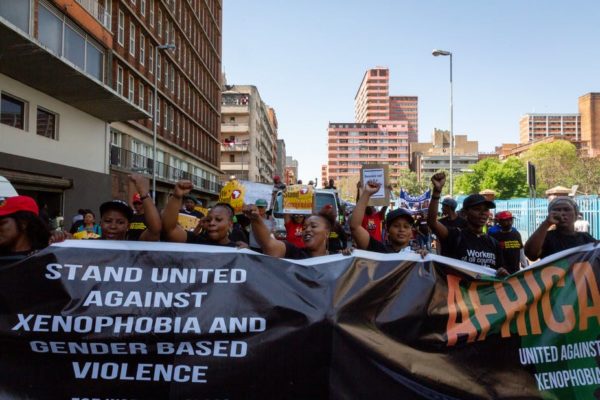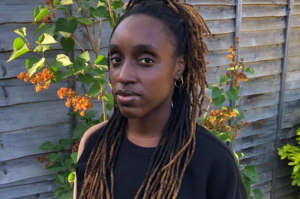
READ: 15 Pieces to Guide Your Understanding of Xenophobia in (South) Africa
Talking xenophobia with South Africans of all classes evokes much emotion. In order to begin undoing xenophobia, I submit that crossing into “the emotional” is the most radical act in which to engage, collectively and individually.
I write as a so-called high-skilled, documented, temporary migrant who has spent five years working in South Africa, first in Cape Town, then in Johannesburg a decade later. I give these specifics to mark my location but also to invite reflection on how little this matters in day-to-day living for racialized—i.e. “non-white,” in South African parlance—migrants in the country. A racialized migrant is a foreigner, a non-national, a foreign national, Non-SA Citizen, kwerekwere: an outsider, regardless of immigration status, time, or historical connection to the country. I am not asking for these terms to not be used. I am asking for a reflection on how easily they are used, the day-to-day meanings and feelings they effect.
Since the latest spate of mass xenophobic violence in South Africa, I have heard and read from media commentators, elected leaders, analysts, academics, even friends, that myriad issues need to be addressed:
Why can they enter so easily?
Why are their crimes not prosecuted?
What are their leaders doing and not doing that makes them come?
South African property has also been damaged.
We need to meet with community leaders if we want long term solutions.
Black South African small businesses are failing and need more support.
Why is South Africa singled out when foreigners are attacked in all countries?
Elected leaders single out foreigners and stir up xenophobia.
We are Afrophobic because of Apartheid.
Xenophobia runs through all social classes in South Africa.
The violence is no different from Durban 1949.
But these, if not accompanied by reflection, are all part explanation, part justification. Without reflection that is personal, collective, random, and organised, umpteen denunciations, declarations, demonstrations will not lead to undoing the emotional drivers of xenophobic acts—the emotions that create the conditions for both collectively expressed, sporadic mass violence and the day-to-day rejection of racialized foreigners.
Here, I begin my reflection to try and respond to the question put to me by a sister-kwerekwere, a domestic worker: “But why do they want to kill us?”
*
I reflect from my experiences in South African workplaces, where my labour has invariably been in high demand and commensurately highly valued in monetary terms, but also where I have experienced rejection by South African colleagues and bosses alike. By rejection, I refer to a number of experiences, none of which may compare in scale or otherwise with those faced by my sister who asked me the question, but all of which are rooted in the same racialized foreignness.
In South Africa, race is raised and erased at some of the most incomprehensible of times. This is why, for instance, the properties of large South African companies were attacked in recent weeks only outside South Africa. Or why the statement—“I am African but I am not black (narrowly defined) and not born in the continent”—is such a difficult notion to hold.
My first set of workplace experiences took place in Cape Town, a decade after 1994 when I’d come to the country on a temporary work permit. I was recommended for a job there by the head of an organisation based in India, which was a partner to both my South African employer-to-be and the organisation in my country that had restructured my job out of existence. My second set of experiences took place in Johannesburg, ten years afterwards, in two separate organisations. In the latter, I had the right to work in South Africa as the foreign spouse of a South African.
As inevitably complicated as migrant worker/employer—and indeed worker/employer—relations are, it would be difficult to get into excessive detail here. The common threads I want to pull out: all the organisations involved white bosses, flanked by black South African (defined broadly: so-called African, Coloured, and Indian) sub-bosses of various types: managers, board members, middle managers. While the white bosses were invariably threatened by the educated, racialised, foreign worker that I was, what has consistently taken me aback is how my South African colleagues (black and white) were in line with the agenda of the white bosses.
Bosses will be bosses in any capitalist context, no matter the country. They will exercise their power for a host of reasons they deem justified. But what has struck me is how my colleagues, intellectual workers like myself, joined in the bosses’ exclusionary tactics and performed or/and delivered the exclusion, which is essentially hate. There was the white boss withholding my last pay cheque after I left the job and calling my colleagues to a meeting to explain that this was justified because I had stolen from the organisation. The employer did not provide any proof and admitted in this meeting that withholding the pay cheque was against the law. Not a single one of my colleagues picked up the mobile to inquire or let me know about the accusation, or even just to check up on me. The vast majority of these colleagues were black South African, and my only friends in town given that I was a relatively new. Needless to say, my white migrant colleague did not face similar trials.
There was the black colleague delivering, on behalf of the white boss, three warnings in a single sheaf of unenveloped papers, immediately after I filed a formal grievance of which the black colleague was aware. There were the many instances of white and black colleagues deleting my name or/and taking credit for my work even though I was the project lead and had performed the bulk of the work. And there was the instance of the white South African colleague, who, when I challenged her on this, told me: “The reason why South Africa is not changing is because there are too many entitled black women like you.”
*
To further locate myself, I reflect on these experiences in South Africa as a racialized worker descendant from a family of migrants from some 100 years back, stretching across four continents. As such, I have known and experienced varying forms of exclusion in various countries, as have those before me. But I stress the above experiences due to the extremity of the hate, which has been unique to my experiences in South Africa.
What lies at the heart of these educated South African workers performing exclusion is the same as that at the heart of the violence propounded on migrants by hostel dwellers and others in recent weeks. Though angry, and justifiably so, with greater powers that be, both groups of South Africans enacted their anger in extreme manners toward foreigners. In the case of the South African intellectual workers, highly exploitative bosses (as acknowledged by all of us) are the source of the anger, but the middle course, the action borne of the anger, is directed at the foreigner; in the case of the perpetrators of mass violence, the anger is with governments’ unrelenting disregard of the impoverishment of the majority and its fallout, but the middle course, the action, is directed towards foreigners.
*
At the heart of this well-known phenomenon of scapegoating is the will to deny the dignity of the racialized foreigner. A will that may be subconscious but is acted upon consciously. A will not unlike that to deny the dignity of the woman who thus becomes the battered woman. Not unlike the will to deny the dignity of the child who thus becomes the rape survivor. Or the will to deny the dignity of the domestic worker who becomes the un(der)paid worker. Or the will to deny the dignity of public servants who remain temporary contract workers after 12 years of street-sweeping and drain-clearing. All are forms of violence that is both systemic and systematically denied.
*
Cuthbeth Tagwirei calls for “new conversations grounded in the everyday experiences of those who always find themselves perpetrators and/or victims of xenophobic crimes.” Pumla Gobodo-Madikizela, co-author of These Are the Things that Sit with Us, says of the book which examines intergenerational repercussions of historical trauma: “people need new spaces where listening to each other’s stories can bring us back to a place of hope.” Tsitsi Dangarembga envisions an entire creative industry as a vehicle for these conversations, throughout the continent. The words of one person who tells his story in These Are the Things that Sit with Us are germane: “I am cross, sad, violent in the way I think. And that makes me quiet. I don’t have strength to be violent, but I feel violent.”
Tshegofatjo Makhafola’s poem, “About Resting in Peace,” underlines that such new conversations and spaces be had and made continuously, urgently, likely for many decades to come:
if you want to make wind whirls out of your grave, make them. bleed dust. groan lightning. exhale wildfires. if you want to seal off your pain or everything by making your grave a disaster, crack the damn fucking ground. make your grave a hurricane. a riot ground. rest in noise, in violence, heal that way. rest in whatever way your body knows.
how do you rest in peace if your body knows none?
“About Resting in Peace” is reproduced here with the author’s permission.
About the Writer:
Ruksana Elk is a pen name.









COMMENTS -
Reader Interactions